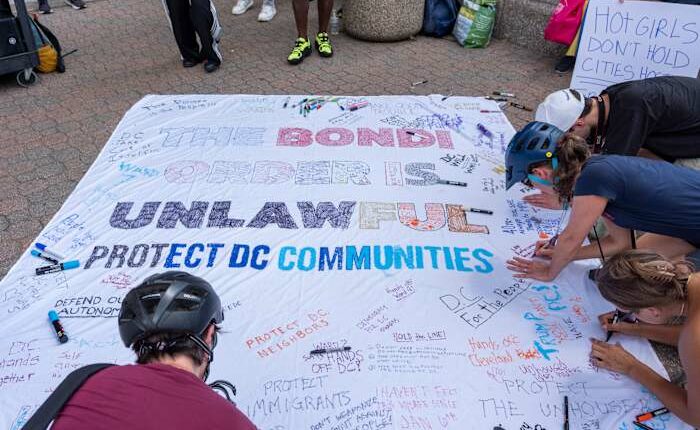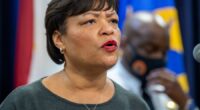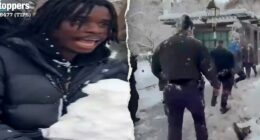Share this @internewscast.com

WASHINGTON – The left perceives President Donald Trump’s bid to assert control over Washington’s law enforcement as part of a broader push towards authoritarian governance — described by one activist as “vindictive authoritarian rule.” This move is seen as particularly audacious given the relatively calm conditions in the capital. Conversely, those on the right view it as a decisive action to dismantle the entrenched Democratic urban bureaucracy, aiming to improve the livability of D.C.
The resolution of this debate — if it ever reaches one — could determine whether Washington, emblematic of America with its majestic monuments, historic significance, and disparities, becomes an example under Trump’s influence of urban policing and governance transformation, or its deterioration.
Under the initiative named the Making D.C. Safe and Beautiful Task Force, Trump deployed around 800 National Guard troops in Washington this week, alleging, “Our capital city has been overtaken by violent gangs and bloodthirsty criminals.”
Grunge was also on his mind. “If our capital is dirty, our whole country is dirty, and they don’t respect us.”
He escalated the situation by asserting federal dominion over the district’s police department and appointed an interim chief, triggering alarm and leading local authorities to pursue legal action against the move. “I have never seen a single government action that would pose a greater risk to law and order than this perilous directive,” said Police Chief Pamela Smith.
By Friday, the Trump administration partially withdrew its attempt to take over the Metropolitan Police Department when a judge, doubting the president’s authority for such an action, encouraged both parties to find a middle ground, which they did — for the time being.
The Justice Department under Trump conceded to keep Smith at the helm, while still seeking to guide her department on policing strategies. In a subsequent memo, Attorney General Pam Bondi instructed the force to comply with federal immigration enforcement policies, regardless of any local legislation.
In this heavily Democratic city, local officials and many citizens did not like the National Guard deployment. At the same time, they acknowledged the Republican president had the right to order it because of the federal government’s unique powers in the district.
But Trump’s attempt to seize formal control of the police department, for the first time since D.C. gained a partial measure of autonomy in the Home Rule Act of 1973, was their red line.
When the feds stepped in
For sure, there have been times when the U.S. military has been deployed to American streets, but almost always in the face of a riot or a calamitous event like the Sept. 11, 2001, terrorist attacks. Trump’s use of force was born of an emergency that he saw and city officials — and many others — did not.
A stranger to nuance, Trump has used the language of emergency to justify much of what he’s done: his deportations of foreigners, his tariffs, his short-term deployment of National Guard troops to Los Angeles, and now his aggressive intervention into Washington policing.
Washington does have crime and endemic homelessness, like every city in the country. But there was nothing like an urban fire that the masses thought needed to be quelled. Violent crime is down, as it is in many U.S. cities.
Washington is also a city about which most Americans feel ownership — or at least that they have a stake. More than 25 million of them visited in 2024, a record year, plus over 2 million people from abroad. It’s where middle schoolers on field trips get to see what they learn about in class — and perhaps to dance to pop tunes with the man with the music player so often in front of the White House.
Washington is part federal theme park, with its historic buildings and museums, and part downtown, where restaurants and lobbyists outnumber any corporate presence. Neighborhoods range from the places where Jeff Bezos set a record for a home purchase price to destitute streets in economically depressed areas that are also magnets for drugs and crime.
In 1968, the capital was a city on fire with riots. Twenty years later, a murder spree and crack epidemic fed the sense of a place out of control. But over the last 30 years, the city’s population and its collective wealth have swelled.
A cooked-up emergency?
Against that backdrop, Philadelphia’s top prosecutor, District Attorney Larry Krasner, a Democrat, assailed Trump’s moves in Washington.
“You’re talking about an emergency, really?” Krasner said, as if speaking with the president. “Or is it that you’re talking about an emergency because you want to pretend everything is an emergency so that you can roll tanks?”
In Washington, a coalition of activists called Not Above the Law denounced what they saw as just the latest step by Trump to seize levers of power he has no business grasping.
“The onslaught of lawlessness and autocratic activities has escalated,” said Lisa Gilbert, co-chair of the group and co-president of Public Citizen. “The last two weeks should have crystallized for all Americans that Donald Trump will not stop until democracy is replaced by vindictive authoritarian rule.”
Fifty miles northeast, in the nearest major city, Baltimore’s Democratic mayor criticized what he saw as Trump’s effort to distract the public from economic pain and “America’s falling standing in the world.”
“Every mayor and police chief in America works with our local federal agents to do great work — to go after gun traffickers, to go after violent organizations,” Brandon Scott said. “How is taking them off of that job, sending them out to just patrol the street, making our country safer?”
But the leader of the D.C. Police Union, Gregg Pemberton, endorsed Trump’s intervention — while saying it should not become permanent.
“We stand with the president in recognizing that Washington, D.C., cannot continue on this trajectory,” Pemberton said. From his vantage point, “Crime is out of control, and our officers are stretched beyond their limits.”
The Home Rule Act lets a president invoke certain emergency powers over the police department for 30 days, after which Congress must decide whether to extend the period. Trump’s attempt to use that provision stirred interest among some Republicans in Congress in giving him an even freer hand.
Among them, Rep. Andy Ogles of Tennessee drafted a resolution that would eliminate the time limit on federal control. This, he told Fox News Digital, would “give the president all the time and authority he needs to crush lawlessness, restore order, and reclaim our capital once and for all.”
Which raises a question that Trump has robustly hinted at and others are wondering, too: If there is success in the district — at least, success in the president’s eyes — what might that mean for other American cities he thinks need to be fixed? Where does — where could — the federal government go next?
___
Associated Press writer Marc Levy in Harrisburg, Pennsylvania, contributed to this report.
Copyright 2025 The Associated Press. All rights reserved. This material may not be published, broadcast, rewritten or redistributed without permission.












